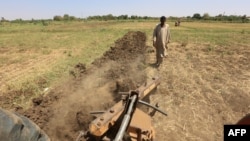Today marks one year since the war between Sudan’s army and its paramilitary wing, the Rapid Support Forces (RSF), began. The war has created widespread hunger, as fields lay uncultivated and aid agencies struggle to reach millions of Sudanese displaced from their homes. Despite the challenges, some farmers are getting support from a British aid organization.
On April 15, 2023, Sudanese awakened to the sound of gunfire, shelling, and the roar of military aircraft as the Sudanese army and the RSF began fighting for control of the capital, Khartoum.
The fighting made it difficult for humanitarian aid organizations to distribute food, and hard for farmers in the conflict zones to plant crops.
The spreading clashes killed thousands and displaced millions from their homes.
Practical Action, a U.K.-based aid group, is working with farmers in states not affected by the war to produce food, fight hunger and improve their economic conditions.
The organization is supporting at least 200,000 farmers and families.
Muna Eltahir, the country director of Practical Action Sudan, says her organization is focused on easing food insecurity.
“We have a project in Al-Gedaref and Kassala,” she said. “We have another project in the Blue Nile to support small farmers in increasing their production and productivity through the provision of seed seedlings and some knowledge for the farmers. And this is also successful and can bridge some gaps, but at a very limited scale because we are one of the very, very few organizations working on sustaining agriculture and farmers rather than distribution of relief.”
According to the United Nations, more than 18 million Sudanese are food insecure, with most trapped in areas of active fighting.
The conflict has disrupted agricultural production, damaging infrastructure and farmers' livelihoods.
Jalal Babiker, leader of the Elekhia Farmers Association, told VOA that farmers in his area have increased production and are cultivating more land.
He said using about 50 feddan of land — equal to about 50 acres — farmers cultivate a variety of crops including potatoes, grapefruit, lemons, bananas, and various vegetables. This year, in collaboration with Practical Action, he said, the farmers embarked on a potato cultivation project in Kassala state, planting approximately 24 feddan across three designated areas.
Residents of Kassala state previously depended on El Gezira and Khartoum for their potatoes and other produce, but the conflict has disrupted the supply chain, and the region is forced to be self-sufficient.
Babiker said the goal in planting potatoes in Kassala state is to improve the business situation of small farmers — planting potatoes to offer farmers cheap potatoes and seedlings and to create employment opportunities for the youth in the region.
Babiker is optimistic about the future of agriculture in his country. However, U.N. High Commissioner for Human Rights Volker Türk warned Monday of an escalation of the conflict as more armed groups join the fighting.
Eltahir worries that Sudan’s war will hinder her work with farmers.
"My nightmare is the conflict will expand to the safe areas where we have our activities,” she said. “Then they will loot the harvest, or they will destroy the cultivated land. And then that would be a real disaster. And everything is expected because, like yesterday, they attacked Al-Gedaref."
Calls from the U.N. and international agencies — urging the warring parties to cease hostilities — so far, have been ignored.




